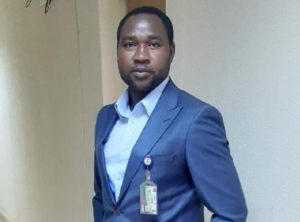Mubarak Bala: The 300 Day Campaign
 Mubarak Bala
Mubarak Bala Mubarak Bala is a Nigerian human rights activist and President of the Humanist Association of Nigeria. On April 28, 2020, Bala was arrested in Kano, a predominantly Muslim state in northern Nigeria, in connection with a Facebook post that authorities alleged violated Section 26(1)(c) of the Cybercrimes Act by insulting the Prophet Muhammed and being “provocative and annoying to Muslims.” To date, Bala has not been officially charged with any crime—a clear violation of his rights under the Nigerian Constitution as ruled by the Federal High Court of Abuja on December 21, 2020.
Yet, today, February 22, 2021, marks the 300th day of Mubarak Bala’s continued illegal detention in Kano State.
In Nigeria, atheists and ex-Muslims are labeled as “apostates” whose very existence is considered blasphemous—making extremist Islamists a serious threat to atheists. Likewise, Nigeria’s parallel court systems, civil and Sharia, both criminalize speech that insults religion. States utilizing Sharia courts, like Kano where Bala is detained, don’t specifically rule on cases involving non-Muslims, but they do interpret customary laws, which are carried over to the secular courts. With “apostasy” and “blasphemy” both prohibited, atheists and humanists alike face social persecution and prohibitive social taboos.
As a humanist and ex-Muslim, Mubarak Bala is a source of contention for the twelve Muslim-majority northern states of Nigeria. His troubles began when he renounced his Islamic faith in 2014. Renouncing one’s Islamic faith in Nigeria is a forbidden act, a dishonor to the family, and a crime punishable by death in its Sharia courts. It’s such a taboo that Bala’s own family consigned him to a mental hospital over the matter. Given these past infringements on his rights, his current detention for the Facebook post raised serious concerns for his safety.
Bala’s legal team worked tirelessly filing a Fundamental Rights petition on May 8th, 2020 with the Federal High Court in Abuja. The petition called for his release on the grounds that the detention violates his rights to liberty, a fair trial, freedom of thought and expression, and freedom of movement under the Nigerian Constitution and international human rights law. However, it’s been an uphill battle trying to protect Bala. The legal team was denied access to meet with him by the Kano State authorities for the first five months of his detention. Nor would authorities confirm whether he was even in their custody. The legal team sought a court order demanding access to Bala, but the police commissioner refused, contending without merit that the order didn’t grant any access. It wasn’t until a rumor of his death began circulating that the legal team was granted access to Bala on October 2, 2020. During this meeting, the legal team learned Bala was receiving death threats from others in the jail. This raised serious concerns for the safety of Bala, his wife, and his daughter. Bala’s Facebook account was also riddled with similar threats.
The hearing for the Fundamental Rights petition was delayed twice, first at the hearing stage and then again for the final verdict. Thus, despite the May 8th filing and the concerns for his safety, it wasn’t until December 21, 2020 that the Federal High Court in Abuja delivered its verdict ruling that Bala’s detention was illegal and ordering his immediate release. This long-awaited ruling offered a glimmer of hope for his family and supporters.
Today is his 300th day of illegal detention. Despite the court’s verdict, the Kano police have yet to release Bala. His legal team’s concern now focuses on the potential of Bala being formally brought to trial. He was transferred to a magistrate’s court on November 23, 2020, but was returned to prison when the magistrate discovered his legal team was present. If brought before a trial court in Kano, Bala’s legal team fears he will not receive a fair trial. Kano has a predominantly Muslim population, and the Sharia courts operate alongside secular courts, interpreting both Islamic law and civil laws. Many fear, then, that both the court and jury would be biased against Bala and he may be subject to severe punishment as insulting religion is illegal even under the civil laws. Consequently, the legal team filed a second Fundamental Rights petition to have him relocated to Abuja, which would significantly raise his chances of a fair trial. Abuja, located in central Nigeria, is free from the Muslim influence found in the Northern states. The legal team is hopeful that the relocation would also prevent any potential for violence in Kano.
After 300 days in confinement, even with a verdict demanding his release, no one can say for sure how much longer Mubarak Bala will remain in Kano custody. It is important to continue raising awareness and advocating for his release. Another day spent incarcerated is another day Bala’s life is threatened merely for the peaceful exercise of his rights to freedom of expression, religion, and belief.
